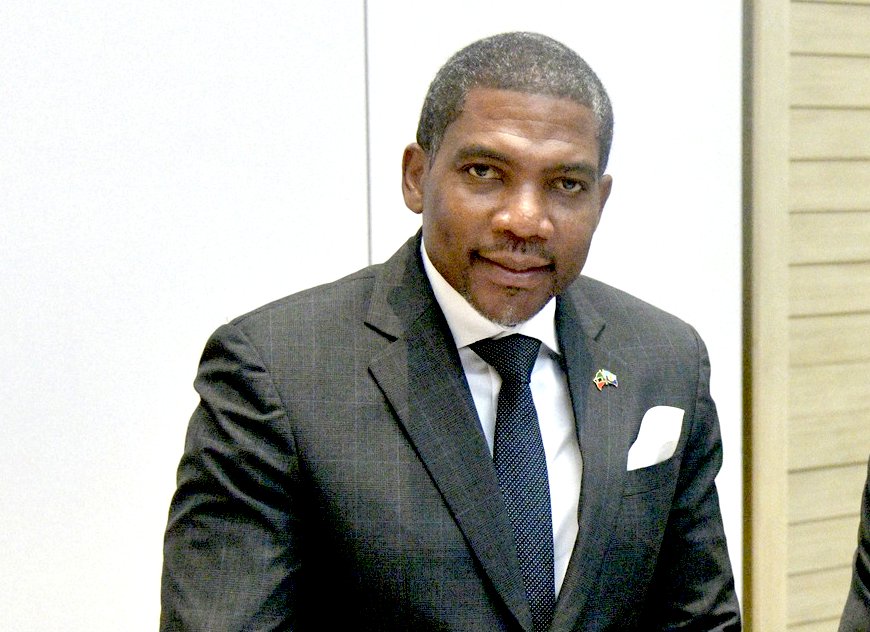Prime Minister Drew Advocates for Trade Justice, Climate Action, and Reinforced International Cooperation at CARICOM Summit.
Prime Minister Hon. Dr. Terrance Drew’s address to the Forty-Eighth Regular Meeting of the Conference of Heads of Government of the Caribbean Community (CARICOM) resonated with the historical struggles and contemporary challenges faced by Small Island Developing States (SIDS) within the Caribbean region. His intervention served as a potent reminder of the systemic inequities embedded in the global economic and environmental landscape, while simultaneously highlighting the resilience and collaborative spirit of the Caribbean community in pursuing sustainable development and seeking historical justice. Dr. Drew’s focus on trade justice, climate resilience, and the imperative for deeper international collaboration underscored the interconnectedness of these issues and their collective impact on the well-being and future of the Caribbean.
Dr. Drew meticulously outlined the historical injustices that have shaped the Caribbean’s economic trajectory, emphasizing the disproportionate impact of global trade rules on vulnerable economies. The collapse of the sugar industry in St. Kitts and Nevis served as a poignant example of how international trade policies, often designed to benefit larger, more developed nations, can decimate vital industries in smaller economies. The abrupt removal of long-standing trade protections, which had provided a degree of stability to the sugar industry, had devastating consequences for the livelihoods of countless individuals and the overall economic health of the nation. This industry, deeply intertwined with the history and cultural identity of St. Kitts and Nevis, representing the struggles and resilience of its people following slavery and colonization, was effectively erased due to external forces beyond its control.
The Prime Minister’s address extended beyond the specific case of the sugar industry to encompass the broader challenges faced by other Caribbean nations in accessing and competing within global markets. He cited the struggles of banana producers, another crucial agricultural sector in the region, which has faced similar pressures from international trade regulations. Furthermore, he highlighted the protracted case of Antigua and Barbuda within the World Trade Organization (WTO) concerning online gambling. Despite a favorable ruling for Antigua and Barbuda, the lack of effective enforcement mechanisms within the WTO system has prevented the nation from fully realizing the benefits of its legal victory. These examples, presented by Dr. Drew, painted a clear picture of a region continuously grappling with an uneven playing field in the global trading system, a system where the rules often appear stacked against smaller economies.
Shifting his focus to the existential threat of climate change, Prime Minister Drew framed the issue not merely as an environmental crisis but as a fundamental matter of climate justice. He emphasized the stark disparity between the Caribbean’s minimal contribution to global greenhouse gas emissions and the disproportionate burden it bears from climate-related disasters. The Caribbean islands, while possessing limited resources and contributing minimally to the problem, are on the frontlines of experiencing the devastating effects of rising sea levels, more frequent and intense hurricanes, and other climate-related phenomena. This injustice is further compounded by the slow and inadequate flow of financial resources intended to assist SIDS in adapting to these changes and building resilience against future climate impacts. The Prime Minister’s words underscored the urgent need for greater global responsibility and action in addressing this inequity and ensuring that vulnerable nations receive the support they need to survive and thrive in a changing climate.
Despite the daunting challenges outlined, Prime Minister Drew’s address maintained a tone of cautious optimism, emphasizing the potential for progress through regional collaboration and strategic international partnerships. He commended President Ali of Guyana for outlining concrete opportunities for collective action, particularly in the development of renewable energy sources, a critical step towards both mitigating climate change and enhancing energy security within the Caribbean. He expressed strong support for this initiative, recognizing its potential to transform the region’s energy landscape and create a more sustainable future. This regional cooperation represents a powerful approach to addressing shared challenges and leveraging collective strengths.
Further solidifying his commitment to sustainable development, Prime Minister Drew reaffirmed St. Kitts and Nevis’ dedication to geothermal energy development. He highlighted the nation’s significant geothermal potential and the increasing investor interest in this renewable energy source, signaling a promising avenue for both economic growth and environmental stewardship. The Prime Minister also acknowledged the strengthening partnership between St. Kitts and Nevis and Germany, highlighting their collaborative efforts in education, healthcare, and scholarship programs, underscoring the importance of international cooperation in achieving national development goals. These partnerships represent valuable opportunities to share knowledge, resources, and best practices, fostering mutually beneficial relationships and strengthening capacity within the Caribbean.
Finally, in a sensitive and thoughtful manner, Prime Minister Drew addressed the ongoing discourse on reparations for the historical injustices of slavery and colonialism. Acknowledging the complexity and sensitivity of this issue, he emphasized its profound significance to the people of the Caribbean. He underscored the importance of engaging in these difficult conversations, even when challenging, as a necessary step towards achieving historical justice and reconciliation. His words served as a reminder of the enduring legacy of these historical injustices and the imperative to address their ongoing impact on the Caribbean region.
In conclusion, Dr. Drew’s address offered a comprehensive and compelling articulation of the challenges and opportunities facing the Caribbean. It served as a powerful call to action for the international community to recognize and address the historical injustices that have shaped the region’s development trajectory, to support its efforts to build resilience against the impacts of climate change, and to create a more just and equitable global economic order that allows SIDS to thrive. His words resonated with the spirit of Caribbean resilience, highlighting the region’s unwavering commitment to sustainable development and the pursuit of historical justice.
Share this content:












Post Comment